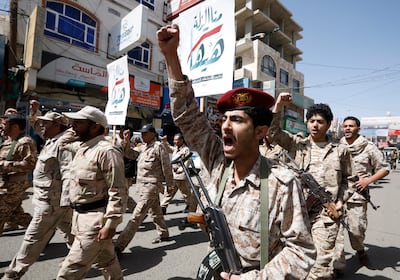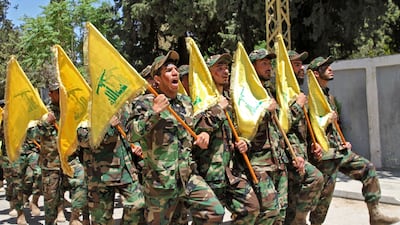Non-state actors including internationally recognised terrorist groups are increasingly acquiring highly sophisticated weapons which pose a significant threat to peace and security, military experts have warned.
Hezbollah, which the US and the UK have designated a terrorist organisation, and the Houthis were cited as examples of organisations showing more powerful capabilities.
The noticeable shift in the tactics of paramilitary, armed resistance and militant groups was noted by speakers at the Royal United Services Institute’s (Rusi) air and missile defence conference on Thursday.
Air Vice Marshal Lincoln Taylor, the Royal Air Force’s Chief of Staff Capability, highlighted the critical role modern weapons such as swarm drones were playing in attack strategies and warned of “an accelerating adversary” when it comes to defence.
Developing technology is increasingly being used by groups, providing them with new fighting methods, he said.
“I’m not just referring to states, I’m talking about non-states as well,” he said. “People are using technologies differently.
“The proliferation and the ability of state and non-states to use some of these technologies to their advantage differently is absolutely paramount. It is accelerating.
“Why is it accelerating? Because the technology is accelerating. The asymmetric advantage of using technology and some of those basic systems differently give them a new way of [waging] warfare.”

Dr Sidharth Kaushal, a research fellow at Rusi, opened the event in London by highlighting the danger of non-state actors.
He pointed out that defence conversations over the past year had quite rightly been dominated by Russia’s invasion of Ukraine, with the threat of state-on-state aggression the source of much discussion. But he emphasised the continued security threat posed to by groups not acting on a state’s behalf.
Mr Kaushal cited the Houthis and Hezbollah as prime examples of organisations in which members are progressively getting their hands on high-tech weaponry.
High-class missiles are being used by the Iran-backed Houthis in Yemen to hit targets, he said.
The Houthis were designated as a foreign terrorist organisation by Donald Trump during his final hours in the Oval Office in January 2021. When US President Joe Biden succeeded him he swiftly reversed the move, following uproar that the designation and resulting sanctions would worsen Yemen's humanitarian crisis.
Since 2004, the rebel faction has been fighting Yemen’s Sunni-majority government, which is internationally recognised as legitimate. The administration is also supported by a Saudi-led military coalition.
In recent years the rebels have expanded their tactics to strike civilian and military infrastructure targets in Saudi Arabia and the UAE. Three civilians were killed in January last year when the Houthis attacked Abu Dhabi with drones and missiles.
Hezbollah’s acquisition of powerful anti-ship missiles was also mentioned by Mr Kaushal.
In May, the Lebanese group, which has the support of the Iranian and Syrian regimes, caused alarm when it posted a video online displaying its upgraded arsenal. Cruise, precision-guided and manoeuvring missiles have been added to the group’s stockpiles. Footage purported to show an “Abu Mahdi anti-ship cruise missile” launcher — one of Iran’s longest-range weapons.


